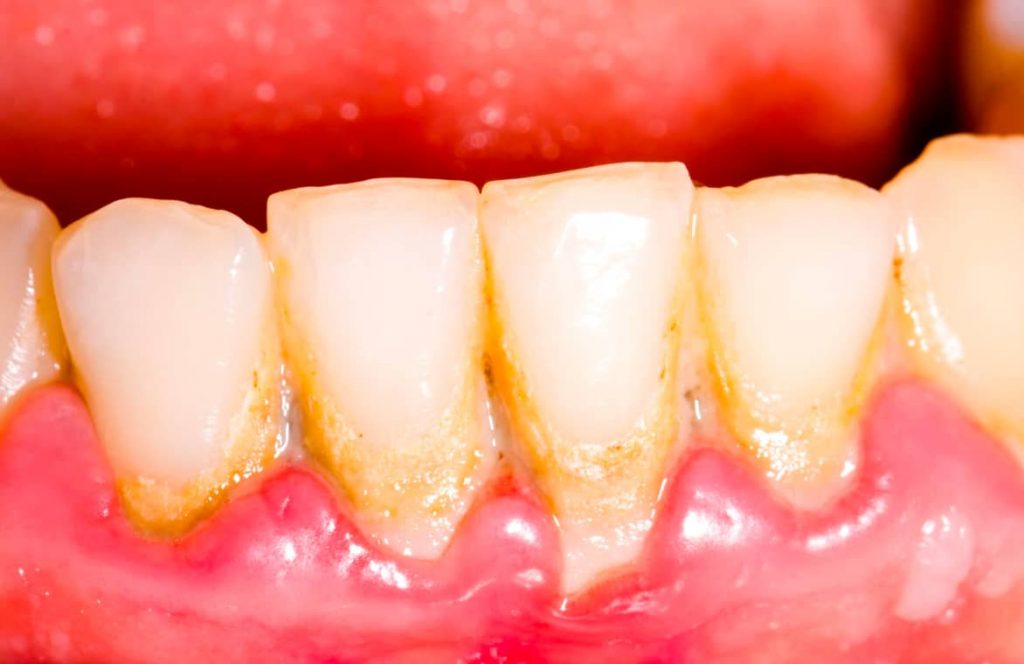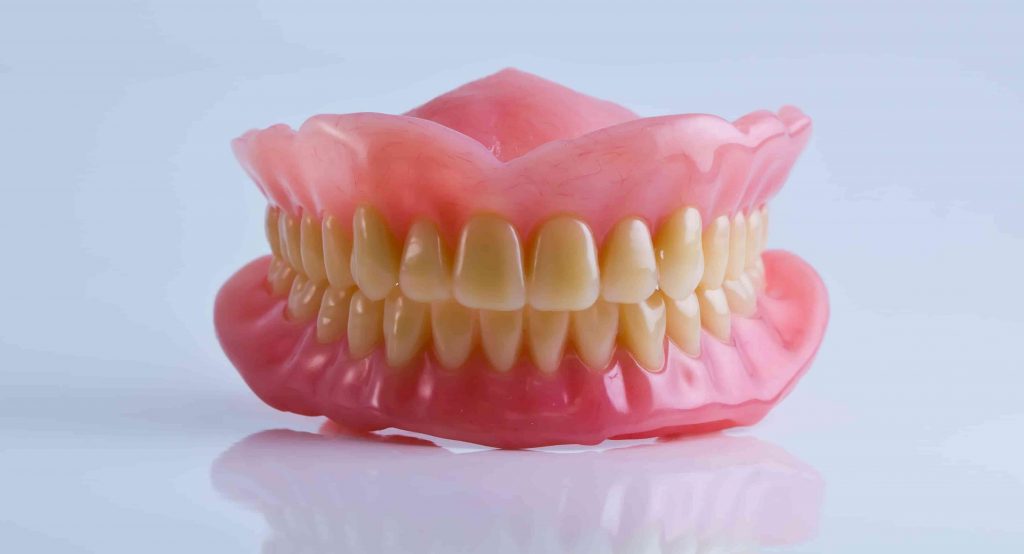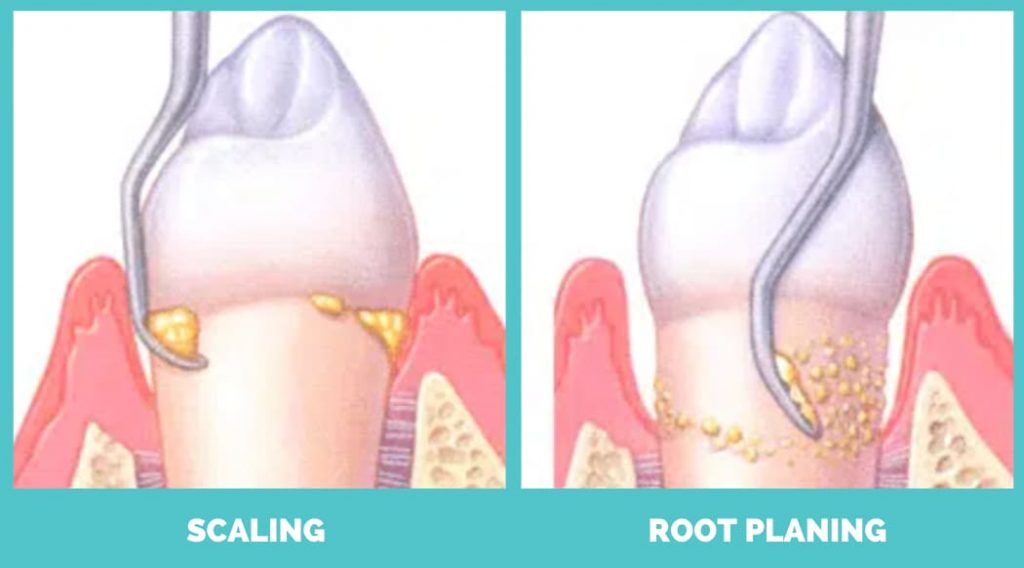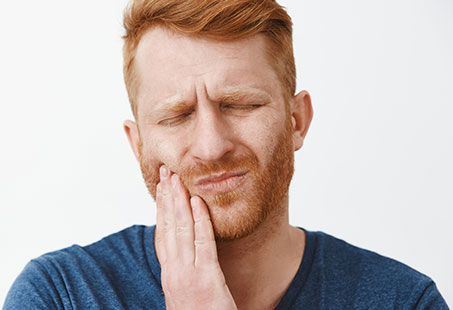It is not uncommon to experience sore gums, which refer to pain or aches in the gum tissue. However, depending on the underlying cause of the problem, this soreness can also be accompanied by other symptoms, such as bleeding, swelling, bad breath, sensitivity, ulcers, etc.
Not all causes of sore gums might be serious, however, some can be indicative of problematic conditions like gingivitis and periodontitis. Other than your diet, lifestyle and personal oral hygiene habits, you can also inadvertently end up experiencing this problem.
In this guide, you’ll learn more about some possible sore gums treatment and their causes. Of course, in any case, if you have sore gums, you must consult a dental professional.
What Causes Sore Gums?
A few of the causes of sore gums are as follows:
Gum Disease
Inflammation of the gums (gingivitis) and spreading of the infection to the surrounding tissues and bone (periodontitis) can make your gums feel sore and painful. Of course, they can also cause other symptoms, such as:
- Swelling
- Bleeding
- Gum recession
- Bad breath
- Shifting teeth
- Tooth loss

There are a number of reasons why gum inflammation can happen, however, plaque is the most common cause. According to InformedHealth.org, smoking, metabolic diseases (e.g. diabetes or hemochromatosis), and pregnancy-related hormonal changes can increase the risk of gum disease.
Brushing Too Hard
Brushing too hard might be another reason why your gums feel sore. It can not cause damage to your gum tissue, but if you keep inflicting trauma on it, you can also experience gum recession. That, in turn, can also cause a range of problems, such as:
- Loose teeth
- Sensitivity
- Bone loss
- Decay of the tooth root

Poor Nutrition
Not eating a healthy and balanced diet can also affect the health of your gums and cause a number of problems, including soreness.
For instance, scurvy is a disease resulting from a deficiency of vitamin C (meaning you’re not eating enough fruits and vegetables). One of the symptoms of this disease is sore, bleeding gums and it can loosen the teeth.
Similarly, vitamin D deficiency has also been associated with a number of oral health problems, including gum inflammation and periodontitis – a symptom of which is gum soreness.
Even with minerals like calcium, there’s evidence to suggest that its deficiency can affect the health of your gums. For instance, a study published in the Journal of Periodontology found that gum disease was more severe in those individuals whose intake of calcium was low.
Using Tobacco
Tobacco products can also leave your gums sore, but, of course, that’s not all that they do. It’s not only a risk factor for gum disease, but it also makes it harder for the gums to heal.

According to the Centers for Disease Control and Prevention (CDC), smoking can negatively affect the body’s immune response, so you might not be able to fight off infection easily.
Dentures
If your dentures don’t fit properly and are cutting into your gums, that can also easily irritate them and give you canker sores as well. But other than that, denture stomatitis, a fungal infection caused by candida, which is common among those who wear dentures can leave your entire mouth tender and sore.

Sore Gums Treatment
The sore gum treatment will depend on the underlying cause of the problem. It can be any one or more of the following:
Deep Cleaning
Scaling and root planing are two deep cleaning treatments that can not only clean the surface of the teeth but also remove tartar from the roots and smooth them out.

This can be helpful for gum disease, but the recommended treatments can be more extensive and invasive if the problem has worsened. For instance, you might need periodontal flap surgery if the gum pockets are very deep.
Eating Healthy
If poor nutrition is the reason why your gums are suffering, your dentist will advise you to work on that. You might be asked to take a blood test to check for deficiencies in vitamins and minerals.
If this is the case, your dentist might give you dietary advice for it. This might include taking supplements, but it’s important you take them on their advice. These supplements won’t help your gums if deficiency is not the problem.
Using A Soft Toothbrush
Using the right toothbrushing technique is as important as using the right toothbrush. If you’re using a brush that has hard bristles, it can quite easily cause damage to the gum tissue and even give you mouth ulcers.
Over time, it can become much more serious in the form of gum recession. So, to avoid that, it’s best to do things right from the start.
Improving Oral Hygiene
A lot of oral health problems stem from poor dental hygiene, which is why it’s so important to take care of it.
It means brushing your teeth twice a day for at least 2 minutes and making sure to floss to get the gunk stuck between the teeth. Additionally, if you have a habit of smoking, you should definitely look into ways to quit it.
Getting Dentures Fitted
Your dentures need to be relined, rebased or remade and it’s mainly because of the changes in the underlying jawbone (it deteriorates in the absence of teeth). If your gums are getting irritated because of your dentures and/or you’re experiencing discomfort while using them, you should consider talking to your dentist.
How Do You Get Rid Of Sore Gums Fast?
While there are many home remedies on the internet that claim to help with sore or painful gums, you must talk to your dentist about it.
Because as mentioned above, sore gums can be caused by a serious health problem and delaying treatment can worsen your health. It’s possible that for short-term gum pain relief, your dentist might recommend you use a topical gel or a painkiller.
How Long Do Sore Gums Take To Heal?
The time taken by your sore gums to heal, again, comes down to what’s made them that way in the first place. If it’s gingivitis, for instance, 10-14 days might be enough to make it go away, but since periodontitis is more severe, it can take longer (in months).
On the other hand, if you have soreness due to mouth ulcers, those also take about 10-14 days to go away. Talk to your dentist about the best treatment for mouth sores. But in the meantime, you shouldn’t aggravate your problem by smoking, not eating healthy or keeping your mouth unclean.
Why Does My Gum Hurt In One Spot?
While only your dentist can give you an accurate diagnosis for this, a few reasons that might make your gums hurt in one spot include:
- Gum abscess
- Trauma (for e.g. your toothbrush hit the gum tissue there)
- Mouth ulcer (an unhealing sore on the lip or inside the mouth can also be a sign of oral cancer)
Conclusion
Sore gums are something that many people experience because of one reason or another. While a lot of the time it can be self-inflicted, it can also happen on its own, such as when the dentures become ill-fitted.
But these problems aren’t anything that you should take lightly. Before you look for any “gum pain remedies” online, it’s important that you get a diagnosis for this problem from your dentist.
For instance, as mentioned earlier, even a mouth ulcer can be a sign of oral cancer, so it’s best to talk to a doctor instead of searching the internet for “home remedies for mouth ulcers.” If your gums don’t feel right to you, book an appointment with your dentist.
There can be many different causes of sore gums, and the most effective gum pain treatment will be recommended to you only after a proper diagnosis.
Reviewed and approved by Dr Izbel Aksit
